
Hozumi Gensho Roshi
Zen Heart
Weiser Books
1992
Zen Heart
Weiser Books
1992
Editor's Note
This collection of 28 teachings by Zen Master Hozumi Gensho reads like an eloquent Dharma chapbook. Hozumi Roshi gently leads you through some of the major themes of Buddhism as presented in the Heart Sutra, the Mumonkan (Gateless Gate), the Hekigan-roku (The Blue Cliff Record), and other Zen texts. Ancient and modern masters are also cited along with passages from the Kansan-shi (Poems from Cold Mountain) and the Nanporoku (a handbook on the Way of Tea). This simple book with a profound message is meant to be sipped and savored like a cup of hot green tea. Enjoy.
The famous sword master Tesshû Yamaoka (1837-1888) left behind the following poem:
But in everyday life a lot of unexpected things happen. No matter where we are, with our family, at school, in society, we always meet other people and we can't deal with everything on our own. Living with others we can experience that it is not enough when we ourselves are well off. When we are ruled by egoism no day is a good day.
The teachings of the buddhas explain it thus: before protecting oneself, one protects others. Protecting others, one protects oneself. Once this way of life has become matter of fact one understands that the problems of society are one's own problems. If everybody thought like that and started solving his or her own problems, then there would be peace between human beings. Sharing each good day thankfully with all other beings, being together peacefully, thus one experiences happiness. Until we have really understood this and realized this in our life we need ascetic practice and, above all, the attitude of taking each day seriously.
Dôgen Zenji (1200-1253) said: "Following Buddha's Way is to get to know oneself. Getting to know oneself means forgetting oneself. Having forgotten oneself, one experiences universal interrelations, the regularity of life. Thus body and mind drop off." For whoever has reached this state of mind it is possible to live "each day as a good day."
The following event is reported about Bodhidharma (ca. 470-543), the founder of the Zen school in China. (The story is reported in the Hekigan-roku (Pi-yen-lu "The Blue Cliff Record" - a collection of 100 cases for Zen study, Case No. 1, Bodhidharma and Emperor Liang.)
Buddha Shakyamuni said: "All day long I have preached the truth and never said anything. All day long I have practiced and yet done nothing." This mind, this mental attitude is important, it is important not to think about one's good deeds and how highly they should be esteemed.
Likewise, in matters of spirit, one should not be content with personal gain. In Zen we take care not to depend on advantages that may be offered by way of reward. I don't need or expect any reward! If you can say this clearly from your heart this attitude changes your life completely. This is the foundation of the mind on the Great Way. Once you have won this attitude you can walk the Way comfortably.
In reality it is like that: when we throw away everything superfluous and live like the clear autumn sky, without clouds, then we can live a happier life.
Most of our current rules for places for Zen practice date from master Hyakujo Ekai (Pai-chang Huai Hai, 720-814). Hyakujo Zenji is also famous for his saying: "One day without work is one day without food." He was very pragmatic and provided his collection of rules to lay the foundations for the organizational structure and self-sustenance of Zen monasteries. He also introduced work as part of daily Zen practice.
Once a monk asked him: "What is it in the Buddha's teaching that we have to be the most grateful for?"
There are people who say that one can heal illnesses, have professional success, or become rich if one believes in something. Today people still believe in such things and it has become fashionable again to believe in religions with divine magic. But one should carefully consider what there is to be grateful for. What is the happiest moment in life? Are we happy when we are rich? Does a long life mean happiness? Are we really happy when we are successful professionally? Saigo Nanshu (a politician of the Meiji era) said: 'No money, no reputation, no life, then we can be useful to other people." How many people can become like that?
Hyakujo Zenji answered the monk: "All alone I am sitting comfortably in my temple." Isn't that a wonderful picture? Hyakujo sitting alone in his big temple.
Time doesn't wait for us. It goes on, flowing like water. Yesterday will never return. Today, this day, is passing with each minute. Tomorrow hasn't arrived yet, it is still the future. Therefore it is said: "Now" exists only here! The present is only in this moment. During this time we can cry or laugh. That's all.
If we then realize how precious it is to be able to sit right now, then this is the thing to be most grateful for.
The haiku poet, Ogiwara Seisensui, wrote an essay on tofu (soy bean curd). I would like to introduce you to parts of that essay, as it is relevant to the topic of Zen.
Just at this moment I am seeing my dinner, soybean curd in yudofu-pot.
I love soybean curd, I can learn a lot from it. Nothing is spiced. With my chopsticks I take a piece of Fudofu, its true face...
Nowadays, it has become necessary for people to shape their lives according to subjective experiences and decide independently on what is good and right.
This subjective ability to decide has to be acquired and promoted. As one regards oneself as immature, one hopes for tomorrow. Recognizing one's imperfection, one tries hard and begins to remedy this lack with courage and energy.
Due to our activity, we humans recognize our positions within society. We experience the interaction of mutual influence and begin to shape our lives anew. This way out of a dead end isn't easy, however. Inside the self, the searcher not only encounters sunshine, but also darkness, sadness, pain, and many other problems, decause of the desire to achieve something. The searcher has many dreams and wishes and has to understand that they can't all be realized. As long as one sticks to one's fantasies, one's problems can't be solved.
After some time, one doesn't know anymore what to do and would rather run away. But where to? One realizes: running away doesn't help! So one constantly thinks about one's problems and treats them with equanimity and resolution.
The same is true for humans. Due to our different, difficult experiences, we become independent, but we cannot live alone. There are family, school, and the world. Within society we want to organize our lives freely and independently, but our minds should work according to social requirements.
In Zen it is said that it is of utter importance to experience cold and warmth for oneself. Nobody can understand what hot or cold water is like because of an explanation. If one really wants to feel and know, then it is necessary to dip one's own finger into the hot or cold wet. Only then one can experience how hot or cold the water is at that particular moment. That's the way with Zen. If one wants to become aware of oneself then one has to enter one's self.
It doesn't matter how often and how long a student has been taught by a master. As long as the student has no experience of his or her own, all knowledge is superfluous because it is not his or her own. One has to search for and find Zen for oneself. Zen teaches without words, without theory and it doesn't pay attention to solemn behavior and conceited thoughts.
In one of his last talks to his students Buddha Shakyamuni explained: "Be your own light, be your own refuge, don't take refuge with others! The teaching ought to be your refuge, don't take refuge in anything else!"
The teachings of the Buddha, who lived in India about 2500 years ago, are the foundation of all Buddhist schools. Zen students ought to know the teachings of Buddha Shakyamuni and use them for orientation in their daily lives.
The origins of Zen lead back to Buddha Shakyamuni. He experienced enlightenment while practicing ascetically in lotus posture. Buddha means "awakened human being," someone who has experienced and realized wisdom. This enlightenment is not something reserved only for Buddha Shakyamuni; it is possible for all humans. Without Zen samâdhi (one-pointedness of mind), he would never have awakened to the truth and he would not have been able to expound. As long as we are without Zen samâdhi we will never understand the sutras.
In Zen one does not depend on words and writings. We have to walk the way of Buddha Shakyamuni to reach the level of his experience. He serves as an example and his teachings are our signposts. In Zen his teachings have been transmitted from successor to successor up to the present day. Buddha-Dharma is the law of the heart. It continues to have its effect at all times, eternally.
Everyday Heart
In the Mumonkan we can read the following remarkable expression: "Everyday heart is the Way!" This means, the Way becomes apparent in our common hearts. The heart becomes able to recognize the Way in itself.
Zen provides the foundation for several arts, which have developed into "Ways". Among others there are the Way of tea (chadô), the Way of flowers (kadô), the Way of calligraphy (shodô), the Way of the sword (kendô/iaidô), the Way of the bow (kyždô). In Zen, "Way" means heart or mind.
It is not enough to pay attention merely to technique and material when practicing the Ways of tea or of flowers. You learn nothing when you only pay attention to appearances. It is necessary to touch the spirit of the Way. The natural heart is the Way.
But now we ask after the sense of life's Way.
"What is the Way?" Nansen Zenji (Nan-ch'üan P'u-yüan, 748-835) answers: "Everyday heart is the Way." This heart doesn't show itself so easily. Even if we have understood, that doesn't mean that we live our everyday heart.
To grasp and to realize our own heart in everyday life - this is what is meant. Then we experience the wonderful state of mind of master Nansen, when he answered this question. This answer is as natural and clear as a mountain brook. The everyday heart is not a dirty heart, for it is originally pure. "Originally" does not mean following one's drives and doing whatever one feels like. There are rules and guidelines to the Way. It leads into an everyday life without problems. In order to get there one needs unceasing effort and ascetic practice. Don't be negligent for even one second, or else it is impossible to reach this heart.
Buddhist India was a paradise for animals. Cows, pigs, goats, or dogs were no annoyance for people. They lived well together. Maybe this atmosphere still exists in India. Honoring all beings, not killing, this is a good thing. How wonderful it is to busy oneself with such thoughts.
Albert Schweitzer was working as a doctor in Africa. He gave people an understanding of "this special reverence for life," and he lived it. This was something he especially respected in "Eastern" religions. In September, 1915, he was on a boat on the Ogone River at sunset. In the middle of a herd of hippos, he was surprised by this experience of reverence for life. From I that day on, he appreciated all life even more.
Those who know how precious life is, honor all beings. Out of this respect, the attitude develops that leads to the protection of all life, neither killing nor hurting. Here the mystery that is the foundation of Eastern philosophy and Eastern thinking, shows itself. The problem of life and death has existed for countless ages and will probably continue to exist for all time.
In the name of Buddha Shakyamuni, no war has ever been fought. (In the teachings of the Blessed One there are no sayings and no foundations that justify or further hatred, greed, and ignorance and those deeds that result from them). He respected all beings. For us, today, it is most important that we do not allow another war to take place on our Earth and that we keep this reverence for life with us as the most important thought.
One Drop of Water
When Giboku was nine years old, he became a monk and began his education in the Ryûshoji in Kyôto. After ten years of ascetic practice, he wanted to leave his monastery and go on a pilgrimage through Japan. His master, however, did not agree. As Giboku wanted to visit other monasteries and other masters, he complained to the supporters of his monastery and told them about his plans. An old man took compassion on him and wanted to support him. "When one has become a monk it is very important, of course, that one goes on a pilgrimage and educates oneself. I'll gladly pay for the expenses of your travels, and you may leave immediately. But there is one condition. Once you have left this temple, you should only come back when you have become a great osho."
Giboku vowed that he would not return if his pilgrimage did not show any (spiritual) success.
On his travels he came to the Zen monastery Sogenji, in Okayama. There he became a student of Gisan Zenrai Zenji (died 1877), an excellent Zen master who was famous for his strength and his meticulousness.
The following story is told:
The Heart of the Way of Tea
I In the Nanporoku, a handbook on the Way of tea, there's an important saying by the tea master Sen no Rikyu: "Even a tea ceremony in the smallest room makes it possible to ascetically practice the teachings of the Buddha. To attach importance to the rich interior of a tea room or a tea house, or to be interested only in extraordinarily good food, those are worldly interests. However, it is absolutely sufficient when the roof doesn't leak. By eating, we keep ourselves from starving. This is the teaching of the Buddha and the meaning of the Way of tea. Those who want to conduct a tea ceremony ought to bring in water, wood, and coal, boil the water, prepare tea, and give this tea to the Buddha and to other people, drink themselves, arrange flowers, light incense. Thus one learns to realize what is happening in Buddhism."
Whoever reads this may realize that a deep mind stands behind the Way of tea.
The room shouldn't be furnished richly, but simply and functionally - as it is important that the roof of a hut doesn't leak. When eating, one shouldn't also wish for something special, but one should be content when one has enough to eat.
One walks up the mountain, fetches wood and fresh water, brings it to the boiling point, and prepares tea from all one's heart. First the Buddha receives tea, then one prepares tea for those present, and finally one drinks oneself. In the room there is a vase holding flowers. The air is filled with precious incense. This action leads to the very heart of the Buddhist teachings. The order also has to be regarded.
Nowadays, people look upon themselves as the center. It would be good for us if we became more modest and didn't want to push ourselves to the foreground.
The spirit of tea respects four principles: Wa, Kei, Sei, Jaku. Wa, the heart of peace and of harmony, is without ego. Kei is respect and esteem for all beings and learning from others. Sei, the pure heart, stands for right deeds and right livelihood, as well as a good conscience. Jaku, silence, blessed quiet, is the most important element of the Way of tea. It is mushin, the awakened heart of the Buddha. One could say that with the perception of silence the world of tea comes into existence.
The Sixth Patriarch, Eno Daikan Zenji (Hui-neng, 638-713), said:
Maka Hannya Haramita Shin Gyo
(Great Prajna Paramita Sutra - Heart Sutra)
This collection of 28 teachings by Zen Master Hozumi Gensho reads like an eloquent Dharma chapbook. Hozumi Roshi gently leads you through some of the major themes of Buddhism as presented in the Heart Sutra, the Mumonkan (Gateless Gate), the Hekigan-roku (The Blue Cliff Record), and other Zen texts. Ancient and modern masters are also cited along with passages from the Kansan-shi (Poems from Cold Mountain) and the Nanporoku (a handbook on the Way of Tea). This simple book with a profound message is meant to be sipped and savored like a cup of hot green tea. Enjoy.
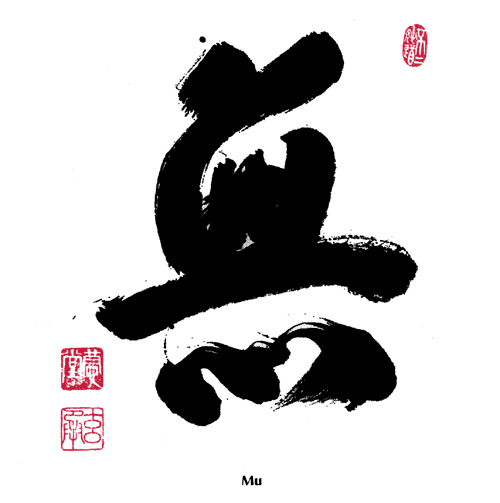
Life resembles flowing water. It never flows backward.
What does modern man search for in his limited life?
Is he searching for vanity?
Development?
His empty heart?
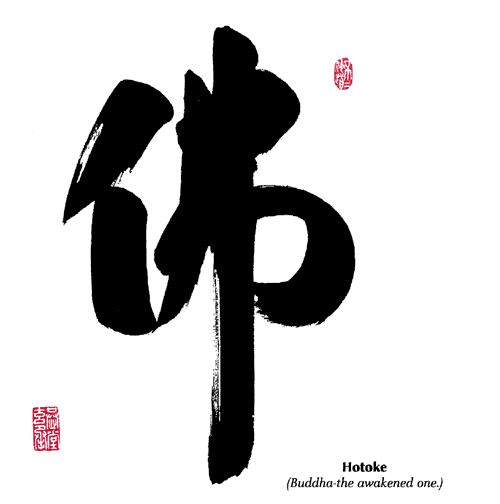
The famous sword master Tesshû Yamaoka (1837-1888) left behind the following poem:
It is good, when the sun is shining.In the Mumonkan (Wu-men-kuan, "Gateless Gate," one of the two primary koan collections) there is one sentence by master Ummon: "Each day is a good day!" In life there isn't either only good or only bad. The situations we encounter are different each time. A good day is comfortable for us and easy to accept. A day with uncomfortable experiences makes us unhappy. We should take Ryôkan Osho's (1758-1831) words to heart, which supremely express his attitude: "When you meet with mishap, you meet mishap and everything is okay. When you become ill you experience your illness and then everything is alright. When your time to die has come, you die, then there is no problem." With such an attitude each day is good for us.
It is also good, when it is cloudy.
The shape of Mount Fuji
isn't affected by this.
But in everyday life a lot of unexpected things happen. No matter where we are, with our family, at school, in society, we always meet other people and we can't deal with everything on our own. Living with others we can experience that it is not enough when we ourselves are well off. When we are ruled by egoism no day is a good day.
The teachings of the buddhas explain it thus: before protecting oneself, one protects others. Protecting others, one protects oneself. Once this way of life has become matter of fact one understands that the problems of society are one's own problems. If everybody thought like that and started solving his or her own problems, then there would be peace between human beings. Sharing each good day thankfully with all other beings, being together peacefully, thus one experiences happiness. Until we have really understood this and realized this in our life we need ascetic practice and, above all, the attitude of taking each day seriously.
Dôgen Zenji (1200-1253) said: "Following Buddha's Way is to get to know oneself. Getting to know oneself means forgetting oneself. Having forgotten oneself, one experiences universal interrelations, the regularity of life. Thus body and mind drop off." For whoever has reached this state of mind it is possible to live "each day as a good day."
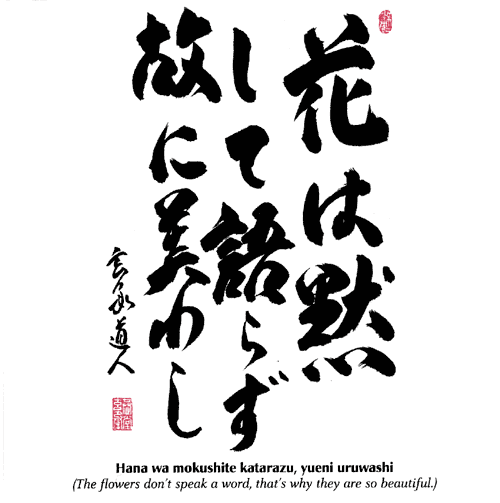
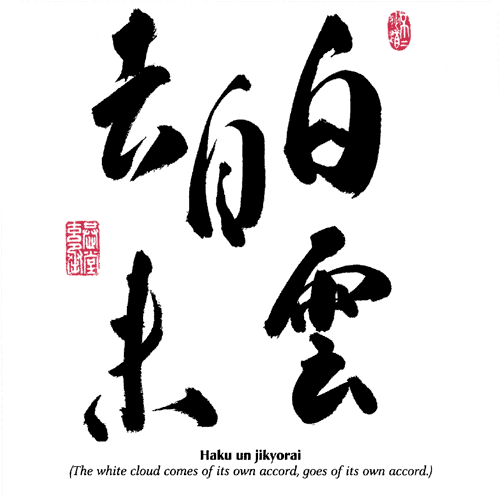
The following event is reported about Bodhidharma (ca. 470-543), the founder of the Zen school in China. (The story is reported in the Hekigan-roku (Pi-yen-lu "The Blue Cliff Record" - a collection of 100 cases for Zen study, Case No. 1, Bodhidharma and Emperor Liang.)
The Emperor was very popular with his people, and he was respected as a compassionate ruler. He was a conscientious, serious Buddhist who built temples, had copies made of the Buddhist writings and copied them himself, and even gave lectures on Buddhist topics. When he met Bodhidharma, he asked him: "Until now I have put so much effort into the promotion of Buddhism. What kind of reward will I receive?" Bodhidharma answered: "Doing good without expecting recompense. There is no reward." Thus he made the Emperor aware of something of utmost importance.Modern people also think mainly about immediate gain. They want to be successful and to fulfill all their desires. But life is not only striving for personal gain. Everybody wants to be greater, richer, better than the others. Everybody wants to attend a good school, to hold an important position in a big company, and so forth. But these kinds of wishes are not easy to fulfill and eventually they are not satisfactory. As soon as one has achieved one thing one starts wishing for the next. That's greed. If one does a good deed for one's family, school, or for society, and does the deed while actually having only one's own gain or praise in mind, then one's mind is no longer undefiled.
Buddha Shakyamuni said: "All day long I have preached the truth and never said anything. All day long I have practiced and yet done nothing." This mind, this mental attitude is important, it is important not to think about one's good deeds and how highly they should be esteemed.
Likewise, in matters of spirit, one should not be content with personal gain. In Zen we take care not to depend on advantages that may be offered by way of reward. I don't need or expect any reward! If you can say this clearly from your heart this attitude changes your life completely. This is the foundation of the mind on the Great Way. Once you have won this attitude you can walk the Way comfortably.
In reality it is like that: when we throw away everything superfluous and live like the clear autumn sky, without clouds, then we can live a happier life.
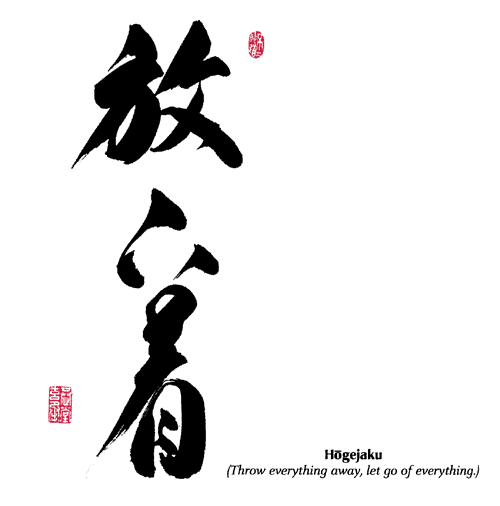
Most of our current rules for places for Zen practice date from master Hyakujo Ekai (Pai-chang Huai Hai, 720-814). Hyakujo Zenji is also famous for his saying: "One day without work is one day without food." He was very pragmatic and provided his collection of rules to lay the foundations for the organizational structure and self-sustenance of Zen monasteries. He also introduced work as part of daily Zen practice.
Once a monk asked him: "What is it in the Buddha's teaching that we have to be the most grateful for?"
There are people who say that one can heal illnesses, have professional success, or become rich if one believes in something. Today people still believe in such things and it has become fashionable again to believe in religions with divine magic. But one should carefully consider what there is to be grateful for. What is the happiest moment in life? Are we happy when we are rich? Does a long life mean happiness? Are we really happy when we are successful professionally? Saigo Nanshu (a politician of the Meiji era) said: 'No money, no reputation, no life, then we can be useful to other people." How many people can become like that?
Hyakujo Zenji answered the monk: "All alone I am sitting comfortably in my temple." Isn't that a wonderful picture? Hyakujo sitting alone in his big temple.
Time doesn't wait for us. It goes on, flowing like water. Yesterday will never return. Today, this day, is passing with each minute. Tomorrow hasn't arrived yet, it is still the future. Therefore it is said: "Now" exists only here! The present is only in this moment. During this time we can cry or laugh. That's all.
If we then realize how precious it is to be able to sit right now, then this is the thing to be most grateful for.
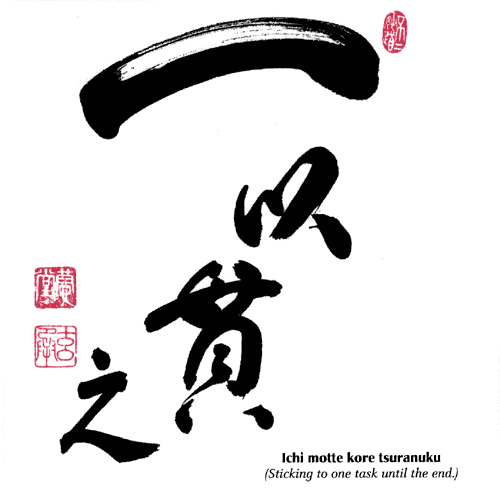
The haiku poet, Ogiwara Seisensui, wrote an essay on tofu (soy bean curd). I would like to introduce you to parts of that essay, as it is relevant to the topic of Zen.
A form as perfect as that of soybean curd actually cannot be found elsewhere. Soybean curd has a square, miserable face, but its head isn't hard and it's no fool. Its softness is perfect and its firmness keeps it in form.In this description we recognize the characteristics of an enlightened master. During ascetic practice, the master experiences deep impressions, feeling, for example, as if lying in a red-hot hearth, fanned by bellows, then snatched out and worked with a heavy hammer. This is how soybean curd is produced as well. Soy beans are ground in a stone mill, then passed through a screen. The raw material for soybean curd is thus only made under great trouble. We cannot achieve its state.
Some say about it that nothing can be done with it. But the opposite is the case. You can cook and fry it, cut it into pieces and put it into soup, serve it with sauce, deep-fry it, or chill it in cold water. The interesting point is that soybean curd takes on a different taste with each different treatment. There is hardly anything like it, as it never minds about its neighborhood. In a stew it sits next to a sea brace without being embarrassed, in the sukiyaki pot it is braised harmoniously with the chicken. In the Noppei soup it's a good friend of radish and potatoes, and in oden it gets on well with konyaku and chikuwa.
Whether on a feast day meal for new year or on a Buddhist fasting table, it always likes to be seen on the plates. It is many-sided and naturally adapts to all situations. Probably this is only possible because it has no obstinate self and it has reached the state of the so-called non-self. Even when it has no place anywhere, it finds life in its heart.
It knows itself: "This is the state I am in." So it sits and is always aware whether it wants to stay at this place or not. Thus it lives honestly in each respective situation. This natural, free form, this is soybean curd.
Just at this moment I am seeing my dinner, soybean curd in yudofu-pot.
I love soybean curd, I can learn a lot from it. Nothing is spiced. With my chopsticks I take a piece of Fudofu, its true face...
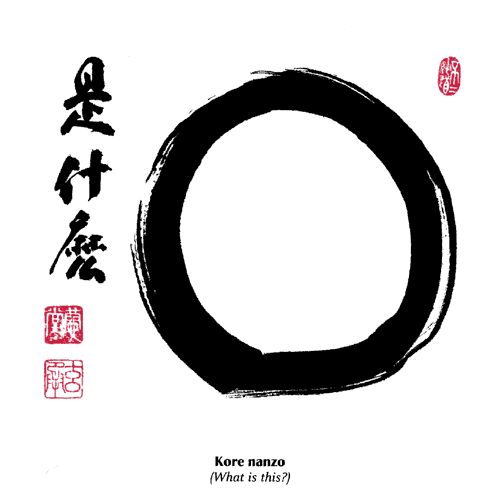
Nowadays, it has become necessary for people to shape their lives according to subjective experiences and decide independently on what is good and right.
This subjective ability to decide has to be acquired and promoted. As one regards oneself as immature, one hopes for tomorrow. Recognizing one's imperfection, one tries hard and begins to remedy this lack with courage and energy.
Due to our activity, we humans recognize our positions within society. We experience the interaction of mutual influence and begin to shape our lives anew. This way out of a dead end isn't easy, however. Inside the self, the searcher not only encounters sunshine, but also darkness, sadness, pain, and many other problems, decause of the desire to achieve something. The searcher has many dreams and wishes and has to understand that they can't all be realized. As long as one sticks to one's fantasies, one's problems can't be solved.
After some time, one doesn't know anymore what to do and would rather run away. But where to? One realizes: running away doesn't help! So one constantly thinks about one's problems and treats them with equanimity and resolution.
There are rocks and roots,The water that comes in rivulets from the mountains runs over all obstacles and goes on. In the beginning the water wasn't clear. The rain, which poured down on the mountains, took earth and stones with it, running over rocks and through roots. But on its way downhill the water naturally becomes clearer. These rivulets become brooks and rivers.
which firmly rest in their place.
Water is different,
it flows everywhere.
The same is true for humans. Due to our different, difficult experiences, we become independent, but we cannot live alone. There are family, school, and the world. Within society we want to organize our lives freely and independently, but our minds should work according to social requirements.
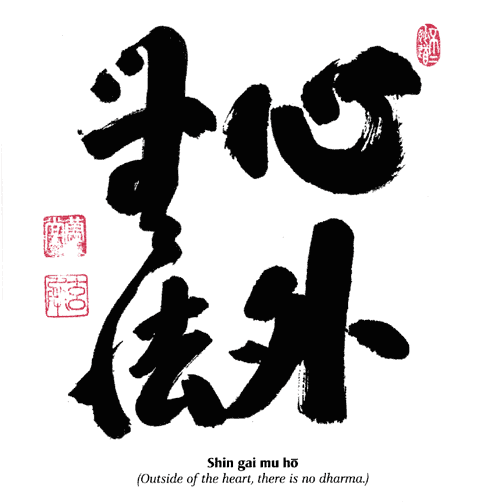
In Zen it is said that it is of utter importance to experience cold and warmth for oneself. Nobody can understand what hot or cold water is like because of an explanation. If one really wants to feel and know, then it is necessary to dip one's own finger into the hot or cold wet. Only then one can experience how hot or cold the water is at that particular moment. That's the way with Zen. If one wants to become aware of oneself then one has to enter one's self.
It doesn't matter how often and how long a student has been taught by a master. As long as the student has no experience of his or her own, all knowledge is superfluous because it is not his or her own. One has to search for and find Zen for oneself. Zen teaches without words, without theory and it doesn't pay attention to solemn behavior and conceited thoughts.
In one of his last talks to his students Buddha Shakyamuni explained: "Be your own light, be your own refuge, don't take refuge with others! The teaching ought to be your refuge, don't take refuge in anything else!"
The teachings of the Buddha, who lived in India about 2500 years ago, are the foundation of all Buddhist schools. Zen students ought to know the teachings of Buddha Shakyamuni and use them for orientation in their daily lives.
The origins of Zen lead back to Buddha Shakyamuni. He experienced enlightenment while practicing ascetically in lotus posture. Buddha means "awakened human being," someone who has experienced and realized wisdom. This enlightenment is not something reserved only for Buddha Shakyamuni; it is possible for all humans. Without Zen samâdhi (one-pointedness of mind), he would never have awakened to the truth and he would not have been able to expound. As long as we are without Zen samâdhi we will never understand the sutras.
In Zen one does not depend on words and writings. We have to walk the way of Buddha Shakyamuni to reach the level of his experience. He serves as an example and his teachings are our signposts. In Zen his teachings have been transmitted from successor to successor up to the present day. Buddha-Dharma is the law of the heart. It continues to have its effect at all times, eternally.
Everyday Heart
In the Mumonkan we can read the following remarkable expression: "Everyday heart is the Way!" This means, the Way becomes apparent in our common hearts. The heart becomes able to recognize the Way in itself.
Zen provides the foundation for several arts, which have developed into "Ways". Among others there are the Way of tea (chadô), the Way of flowers (kadô), the Way of calligraphy (shodô), the Way of the sword (kendô/iaidô), the Way of the bow (kyždô). In Zen, "Way" means heart or mind.
It is not enough to pay attention merely to technique and material when practicing the Ways of tea or of flowers. You learn nothing when you only pay attention to appearances. It is necessary to touch the spirit of the Way. The natural heart is the Way.
But now we ask after the sense of life's Way.
"What is the Way?" Nansen Zenji (Nan-ch'üan P'u-yüan, 748-835) answers: "Everyday heart is the Way." This heart doesn't show itself so easily. Even if we have understood, that doesn't mean that we live our everyday heart.
To grasp and to realize our own heart in everyday life - this is what is meant. Then we experience the wonderful state of mind of master Nansen, when he answered this question. This answer is as natural and clear as a mountain brook. The everyday heart is not a dirty heart, for it is originally pure. "Originally" does not mean following one's drives and doing whatever one feels like. There are rules and guidelines to the Way. It leads into an everyday life without problems. In order to get there one needs unceasing effort and ascetic practice. Don't be negligent for even one second, or else it is impossible to reach this heart.
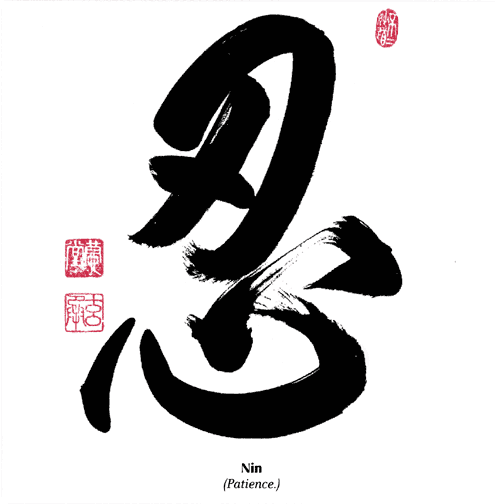
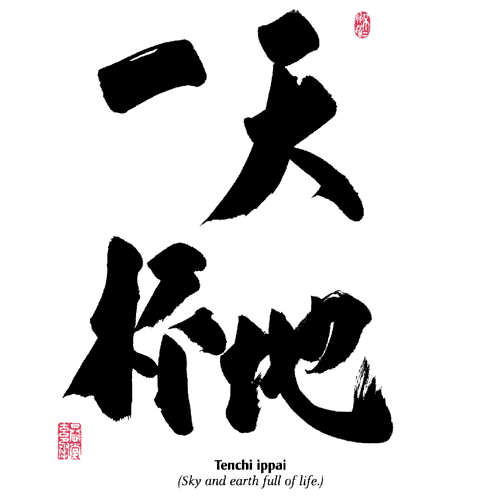
Buddhist India was a paradise for animals. Cows, pigs, goats, or dogs were no annoyance for people. They lived well together. Maybe this atmosphere still exists in India. Honoring all beings, not killing, this is a good thing. How wonderful it is to busy oneself with such thoughts.
Albert Schweitzer was working as a doctor in Africa. He gave people an understanding of "this special reverence for life," and he lived it. This was something he especially respected in "Eastern" religions. In September, 1915, he was on a boat on the Ogone River at sunset. In the middle of a herd of hippos, he was surprised by this experience of reverence for life. From I that day on, he appreciated all life even more.
Those who know how precious life is, honor all beings. Out of this respect, the attitude develops that leads to the protection of all life, neither killing nor hurting. Here the mystery that is the foundation of Eastern philosophy and Eastern thinking, shows itself. The problem of life and death has existed for countless ages and will probably continue to exist for all time.
In the name of Buddha Shakyamuni, no war has ever been fought. (In the teachings of the Blessed One there are no sayings and no foundations that justify or further hatred, greed, and ignorance and those deeds that result from them). He respected all beings. For us, today, it is most important that we do not allow another war to take place on our Earth and that we keep this reverence for life with us as the most important thought.
One Drop of Water
When Giboku was nine years old, he became a monk and began his education in the Ryûshoji in Kyôto. After ten years of ascetic practice, he wanted to leave his monastery and go on a pilgrimage through Japan. His master, however, did not agree. As Giboku wanted to visit other monasteries and other masters, he complained to the supporters of his monastery and told them about his plans. An old man took compassion on him and wanted to support him. "When one has become a monk it is very important, of course, that one goes on a pilgrimage and educates oneself. I'll gladly pay for the expenses of your travels, and you may leave immediately. But there is one condition. Once you have left this temple, you should only come back when you have become a great osho."
Giboku vowed that he would not return if his pilgrimage did not show any (spiritual) success.
On his travels he came to the Zen monastery Sogenji, in Okayama. There he became a student of Gisan Zenrai Zenji (died 1877), an excellent Zen master who was famous for his strength and his meticulousness.
The following story is told:
One summer evening, master Gisan was taking a bath. The water was too hot so he called for Giboku and told him to fetch cold water. Giboku fetched water from the well and poured it into the tub. When it was full, he thoughtlessly poured the rest on the ground. At this moment the master brusquely admonished him: "Idiot! Every thing can be used, whether big or small. Why did you not save the spilled water for something useful? With every small amount of water, you can water the garden. Why couldn't you use it for the life of a plant, a tree, or a flower? Don't you understand what 'hidden benefit' means? You immoral monk!"The admonition of his master had such a strong effect on him. This is wonderful. The ascetically practicing student should take him as an example. Especially in our times one ought to learn from "one drop of water." For we still don't consider enough how we can make ourselves useful.
From that day Giboku changed. To express his respect for each drop of water he called himself "Tekisui" - one drop of water.
On his deathbed he said:Sogen's one drop.
For about 70 years I tried to be of use.
I lived in harmony with earth and heaven, in order to realize these teachings.
But still it isn't enough.
The Heart of the Way of Tea
I In the Nanporoku, a handbook on the Way of tea, there's an important saying by the tea master Sen no Rikyu: "Even a tea ceremony in the smallest room makes it possible to ascetically practice the teachings of the Buddha. To attach importance to the rich interior of a tea room or a tea house, or to be interested only in extraordinarily good food, those are worldly interests. However, it is absolutely sufficient when the roof doesn't leak. By eating, we keep ourselves from starving. This is the teaching of the Buddha and the meaning of the Way of tea. Those who want to conduct a tea ceremony ought to bring in water, wood, and coal, boil the water, prepare tea, and give this tea to the Buddha and to other people, drink themselves, arrange flowers, light incense. Thus one learns to realize what is happening in Buddhism."
Whoever reads this may realize that a deep mind stands behind the Way of tea.
The room shouldn't be furnished richly, but simply and functionally - as it is important that the roof of a hut doesn't leak. When eating, one shouldn't also wish for something special, but one should be content when one has enough to eat.
One walks up the mountain, fetches wood and fresh water, brings it to the boiling point, and prepares tea from all one's heart. First the Buddha receives tea, then one prepares tea for those present, and finally one drinks oneself. In the room there is a vase holding flowers. The air is filled with precious incense. This action leads to the very heart of the Buddhist teachings. The order also has to be regarded.
Nowadays, people look upon themselves as the center. It would be good for us if we became more modest and didn't want to push ourselves to the foreground.
The spirit of tea respects four principles: Wa, Kei, Sei, Jaku. Wa, the heart of peace and of harmony, is without ego. Kei is respect and esteem for all beings and learning from others. Sei, the pure heart, stands for right deeds and right livelihood, as well as a good conscience. Jaku, silence, blessed quiet, is the most important element of the Way of tea. It is mushin, the awakened heart of the Buddha. One could say that with the perception of silence the world of tea comes into existence.
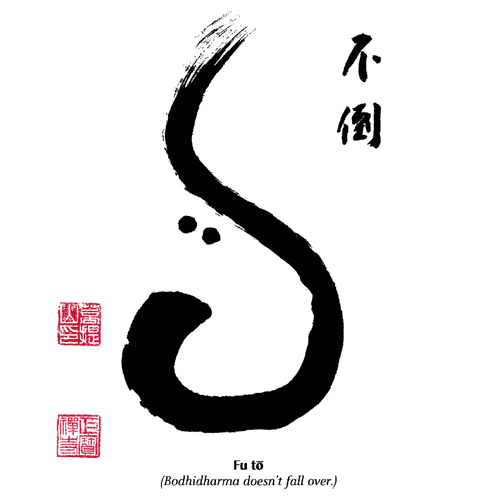
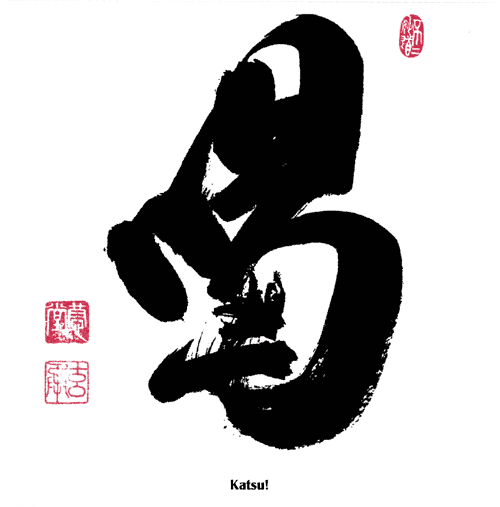
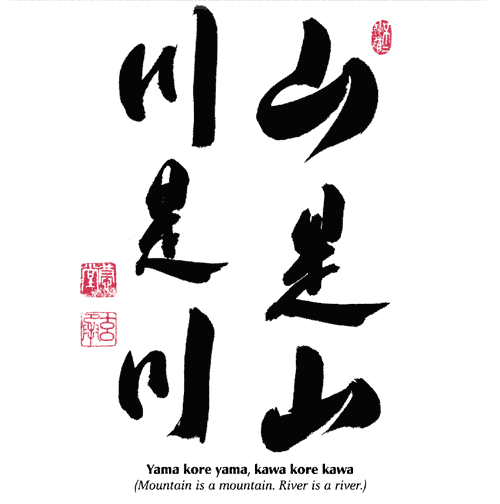
The Sixth Patriarch, Eno Daikan Zenji (Hui-neng, 638-713), said:
On the border between good and bad
without producing thoughts,
sitting, this is Za.
Looking inward,
resting in oneself, immovable,
this is Zen.
Maka Hannya Haramita Shin Gyo
(Great Prajna Paramita Sutra - Heart Sutra)
The Bodhisattva Avalokiteshvara (Japanese: Kannon) clearly recognizes that the five skandhas are altogether empty and thus saves all those who suffer.
O Shariputra, form is not different from emptiness and emptiness is not different from form. Form is simply emptiness and emptiness is simply form. The same is true for emotions, perception, wishing, and consciousness.
O Shariputra, all dharmas are empty appearances, they don't come into existence and they don't lose existence, they are neither impure nor pure, neither increasing nor decreasing. For this reason, in the middle of emptiness there is no form, no emotion, no perception, no wishing, and no consciousness; no eye, no ear, no nose, no tongue, no body, and no mind; no color, no taste, no touch, and no dharma, no realm of consciousness, no ignorance, no growing older, and no dying, and no ceasing of growing older and of dying, no suffering and also no reason for suffering, no ceasing and no way there, no realization and also no achievement, as there is nothing to achieve.
The bodhisattva, who relies on the prajna paramita, is free of fear in the heart, and because he is free of fear he is courageous and leaves all illusions behind and finally reaches nirvana.
The buddhas of the three times - past, present, and future - rely on the prajna paramita and thus reach the state of complete awakening.
Therefore, realize this prajna paramita as the holy mantra, as the mantra of exalted wisdom, as the unsurpassable mantra, as the incomparable mantra, which can delete all suffering. It is truth without wrong.
Therefore, recite the prajna paramita mantra thus:"Go, go, go beyond, beyond all boundaries into the complete awakening."Song of wisdom.